The CBD Expert Series: Jackie Bowen from Clean Label Project
Believe it or not, not all CBD companies are looking out for your best interest. When it comes to what you see—or don’t see—on the label, some unknowingly mislead customers; others could be purposefully deceitful. This unsettling reality isn’t just limited to the CBD industry, but the mislabeling of cannabidiol products seems, sadly, to be the norm.
In a space largely lacking government regulation, the need for a justice-providing, rule-enforcing presence becomes clearer every day. Enter Jackie Bowen, Executive Director of Clean Label Project. Clean Label Project lab tests popular consumer goods in the U.S. for harmful contaminants and toxins, and verifies the claims being made on product labels.
Recently, CBD Oil Review’s Nick Musica talked to Jackie about what she’s found to be true, and untrue, in the mislabeled world of CBD.
Nick Musica (CBD Oil Review): Can you tell us a little about who you are and the mission of the Clean Label Project?
Jackie Bowen (Clean Label Project): Yes, I'm the Executive Director of Clean Label Project. By training, I like to consider myself a food safety and quality systems engineer, which essentially boils down to that I'm a professional Debbie Downer and total buzzkill at dinner parties. I know about the inner workings of different food and consumer packaged goods.
The Clean Label Project is a national nonprofit with the mission to bring truth and transparency to consumer product labeling. When you think about traditional food safety, the FDA does a pretty good job of regulating things like E. coli, salmonella, and listeria, which can cause adverse health effects like vomiting or diarrhea within 24 to 72 hours.
But what's been interesting over the past several years, is we’ve seen a significant increase in consumer media, regulatory, and academic attention being paid to industrial and environmental contaminants and toxins. Things like heavy metals, pesticide residues, and plasticizers; many of these things, when it comes to the regulatory fabric in America, are largely unregulated. But in the court of public opinion, these are especially important.
What I like to think that Clean Label Project does is bridge the gap between what's required in the court of law and what it is that consumers truly care about when it comes to purchasing products for themselves as well as their family.
How does the Clean Label Project test CBD products?
So when it comes to CBD products, we purchased 208 of the best-selling CBD products in America. The way we were able to get this list was by using information from different websites that are frequently visited by consumers as well as looking at Amazon and pulling products from the marketplace.
And what we do is use a process that I call the Consumer Chain of Custody Sampling and Testing Program. In other words, what I do is take the shopping list and go to grocery stores, local co-ops, different brand websites, and I purchase products just as a consumer would. The only difference is instead of taking them home and putting them in my medicine cabinet or my bathroom drawer, I take them to an analytical chemistry lab for analytical chemistry testing.
When I did this for the top-selling CBD products, I saw three significant issues: discrepancies in the CBD potency of what's declared on the label versus the true content, issues in how brands interpret what it means to be “THC-free,” and the levels of heavy metals, pesticide residues, and plasticizers were concerning.
This is the same type of information that I provided to the FDA as part of my testimony back on May 31st. Some of these findings were also validated by the recent Center for Food Safety study.
Can you tell us about that study?
I was not part of the Center for Food Safety study, but recently last week, another nonprofit organization that's focused on food and transparency came out with their own independent report card, if you will, about the CBD marketplace and which products did particularly well, as well as which products had room for improvement. And within that study, they cited issues related to contaminants as well as issues related to transparency.
So, two different organizations, two different labs, different CBD products, and still the same results were found?
Correct.
But one of the things I want to make sure that's clear is when I look at the CBD category and some of these overall systemic issues well, what it suggests to me is these are issues that can be overcome. Absolutely.
What you see are quality assurance and quality control issues. Because this is an emerging category, because it's one that hasn't had the same regulatory oversight, what we see is some kind of inconsistency and an industry that's still in its infancy when it comes to quality control and quality assurance.
How does this lack of quality control affect products that claim to be “THC-free”?
When it comes to THC specifically, you've got these products that are going to be sold as hemp, which cannot exceed this hard cutoff of 0.3% THC content. But just because something has below that percent threshold, doesn't mean that it's THC-free. And one of the ways that I always like to explain it is kind of through watching the evolution of the gluten-free market
It was interesting because when you watched the evolution of gluten-free, you have people in America that are suffering from celiac disease and in order to kind of treat that or handle it, they follow a gluten-free diet. But what happened in the marketplace was there wasn't a regulatory definition of the word “gluten-free”. So for several years, the gluten-free community, the celiac community was asking FDA for a definition.
When looking into the marketplace, looking at the food and consumer packaged goods that were making these claims, what could consumers confidently rely on for a definition of gluten-free? How can the industry go about formulating to comply with this federal regulation of the word “gluten-free”?
And ultimately, what happened was that the FDA set the definition, a preliminary definition, that was conditional upon after trying it in the marketplace. The definition that they used was less than 20 ppm. So, if something has gluten less than 20 ppm, it's something that has met the definition of gluten-free.
When you look at THC-free, sometimes what you see is brands interpreting it as less than that 0.3% THC content. That doesn't necessarily make it THC-free. It just means that the product isn't technically marijuana. It means that it meets the definition of hemp, but in no way does it make it THC-free. So from my perspective, it's a matter that brands kind of need to take it upon themselves to disclose to a consumer, “Here's my level of quantification of testing. Here's my level of detection.”
If you're concerned about having this be high risk, then put some type of warning on it. But right now, what you see in the marketplace is inconsistency in how that definition of THC-free is being applied. So in some cases, people are using below certain thresholds. Other brands look like they're implying that if it has below a certain level of detection or level of quantification through testing, it meets that definition. But overall, what you see is that across THC-free labeled products, 45% of those products do contain at least trace levels of THC.
When you look at THC-free, sometimes what you see is brands interpreting it as less than that 0.3% THC content. That doesn't necessarily make it THC-free.
If we were to use gluten-free as our model, what should we expect as far as FDA regulation, and when should we expect it?
Yeah, that's a really great question. I can only kind of read the tea leaves and look at it as if it was something that I was going to do.
I guess through my lens, it's one where, at least with gluten-free, it seemed like there was a preliminary definition that was subject to change. The FDA put into marketplace to see how it worked before it was finally adopted. So, do I think that could be a model that we could see? Maybe.
But I think ultimately, it's not just the definition of THC-free that that we have to worry about or we can expect clarification on. I mean, there's other claims around whole plant, broad-spectrum, those types of things that I also think are in need of additional definitions.
Across the board, in order for the industry to self-regulate and look at compliance, there's going to be certain key things that first need to be established. And to me, it's going to be establishing the definitions. Because there are so many important cutoffs in terms of tolerances, there's going to need to be standardized testing as well as methods that will also need to be established. Because until you set the rules of the game, it will be difficult for industry to follow as well as for consumers to have certain expectations of what compliance looks like for brands.

Jackie at the Bill Sponsor signing ceremony for SB19-220 and SB19-240 with Colorado Governor Jared Polis and Senator Stephen Fenberg. The two bills lay out regulations for industrial hemp production in Colorado.
What about CBD products that are labeled as “certified organic”? Is there as much gray area there?
The way that USDA organic certification works in America is that the USDA has a group of accredited certification agents. Essentially, they serve as the USDA boots on the ground to make sure that anything that's destined to enter the U.S. that's labeled as organic meets organic law. In other words, there can be ones that are domestic focused, more on the raw commodity product. There are ones that work on the processed food side. And there could be ones in other countries around the world that ultimately will be exporting to the U.S., where if it enters the U.S., it must comply with US organic law.
So along those lines, to your point, if a CBD product is labeled as “certified organic”, then it will need to be accompanied by a COB (Certified Organic By) statement, which is required by the USDA national organic program. If you want a double-check, you'll want to go to the website for whoever it's certified organic by. Many times, you'll see things like Quality Assurance International or California Certified Organic Farmers. You want to go to that website. You want to make sure that that product is listed there too.
It's not just a matter of looking at the ingredient label. If you go to that actual certifier's website, do they list that brand? Do they list that product?
In general, how much should CBD buyers trust what’s on a product’s label?
I mean, one of the things that I always like to say, and what we do at Clean Label Project is sometimes what's not on the label is what matters most. Marketing departments can do a really effective job at selling comfort and security. I mean, when was the last time that you picked up a box of cereal or a bottled water or even CBD, and you saw something on the label that said, well, this product is entirely, meh? [sic] In fact, it has a BPA-leeching problem and it has elevated levels of lead. Everything is labeled as wholesome, good, and sustainable. So when everything is labeled that way, how do you actually differentiate between the two?
That's why I like trusting analytical chemistry for what's actually not disclosed on the label. So when it came to testing the 208 top-selling CBD products, the ones that I thought were most interesting that came through in the testing were the levels of heavy metals, the levels of pesticides, as well as phthalates, which is a plasticizer.
And one of the things that I really love about the CBD category is how much this category has embraced transparency in terms of the use of QR codes and posting those Certificates of Analysis. While there's definitely room for improvement around what's tested and the sensitivity it's being tested for, the extent that they've embraced transparency for consumers to give them that visibility, I think is really important.
Do you think Certificates of Analysis do a sufficient job of providing transparency?
I have a love-hate relationship with Certificates of Analysis. So let me first kind of report on how certificates of analysis are generally generated. Across the board, more testing from my perspective is always better than less testing. But traditionally, the way Certificates of Analysis are created is that a brand will create their finished product. They'll take a sample of their finished product. They'll put it in a box and they'll send it off to a third-party analytical chemistry laboratory. There's a few things, from my perspective, that a brand could improve where quality or independence could be compromised.
When it came to testing the 208 top-selling CBD products, the ones that I thought were most interesting that came through in the testing were the levels of heavy metals, the levels of pesticides, as well as phthalates, which is a plasticizer.
The first one would be that you have a brand that's going to their warehouse and self-selecting the sample that gets sent out, then goes in a box and goes to the laboratory. When it arrives at the laboratory, when you're talking about analytical chemistry, it's about the calibration of the instrumentation. It's also about the capability of the instrumentation that's being used.
You can use something like an inductively coupled plasma mass spectrometer, which is an instrument that's typically used to measure for heavy metals. And I've seen laboratories that test for lead down to single-digit parts per million, and other ones that can test down to single-digit parts per billion. What you're talking about is a thousand-fold increase in sensitivity between those two types of calibration. In one case, if you're only testing down to parts per million, you could get non-detect. But if the laboratory that you go to test down to parts per billion, all of a sudden you will see different test results.
I like to assume the best from brands, in doing their due diligence to do the right thing. But ultimately in that case, if you go to a laboratory that has very weak sensitivity, you're going to end up with a Certificate of Analysis that has a bunch of non-detects. And the reason for that, again, is the level of detection and the level of quantification from their instrumentation is just higher, so it's yielding these non-detects. What that gives brands as well as consumers, is a false sense of comfort and security about what's truly inside of that product.
How can CBD brands improve their testing processes?
What I like to do, and what we do at Clean Label Project is I had mentioned before, is use a process that we call Consumer Chain of Custody Sampling and Testing. When the person in QA or QC pulls the product from the warehouse and sends it out for testing, for me, as a consumer, as well as being a cynical consumer, it doesn't matter what was pulled from the warehouse. What matters to me is what's on the store shelf. What is ultimately being purchased by consumers that will end up in medicine cabinets and drawers across America?
It's not what you put in a box. It's more of, what am I putting into my shopping cart? And that's why I like what we do at Clean Label Project because we focus on what Americans, the consumers, are buying. This isn't the product that was pulled off back at the warehouse. This is truly what is sitting on grocery store shelves right now. And I think that just gives a lot more transparency if those test results are consistent.
What advice would you give to the average consumer who is looking to buy CBD off the shelf?
I have my own thoughts on that based on my experience and testing both CBD as well as other food and consumer packaged goods. One of the things that I have noticed is that in the food and consumer packaged goods category, what you see is a lot of co-manufacturing, which means that a third-party manufacturer is the one that actually creates the product and some of these brands are brand owners that bring it to market, which is fine. The thing is that in some of these cases, what you see is that by using a co-manufacturer, the ingredient sourcing, the quality assurance, the quality control, the relationships of the suppliers are essentially outsourced to that third-party manufacturer.
It's not what you put in a box. It's more of, what am I putting into my shopping cart? And that's why I like what we do at Clean Label Project because we focus on what Americans, the consumers, are buying.
In the case of what I observe when doing cross-testing, is that the closer that the finished brand is to the ingredient supplier, the better the finished product will be. In other words, if you've integrated a brand in the case of CBD, if they own their farms, if they own their manufacturing, then they're able to dictate the quality assurance and the quality control because they essentially have that direct relationship, that direct responsibility and oversight. From my experience, in looking across food and consumer packaged goods, the more vertically integrated and the stronger relationships between a brand and their suppliers, the better.
Sort of like the philosophy of eating farm-to-table.
Yes. It's always interesting to look at it through that lens because sometimes you hear of people who want to support small brands, which is great, and just because a brand is big doesn't necessarily make it bad. This is a very scale-neutral, but it's more of an approach that whether you're a big organization within CBD or whether you're a startup, having those strong relationships and knowing your farmers and knowing where your ingredients come from only makes your finished product better.
So, I would always encourage any consumer to look to manufacturers through that type of lens and then see how you feel about your product.
What is the one thing about CBD and labeling you hope people take away from this interview?
I guess, there would be a couple things. I think first it's a matter of being a conscious consumer. It's about asking questions, doing your diligence in today's day and age of social media as well as transparency. It's a great way to kind of get it out there and ask brands more questions.
Another thing that I would say when it comes to CBD, I think over the next year, it's going to be really interesting for the CBD industry. I think once big retail starts selling CBD, even in the absence of regulation, they're going to have higher expectations of quality assurance and quality control. This is great for both consumers as well as for industry. So I think it's a really exciting time for the category as well as consumers. And I think the next year will tell a lot.
More Expert Series Interviews
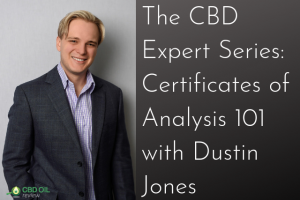
The CBD Expert Series: Jackie Bowen on Mislabeled & Misleading CBD Oil
Read More
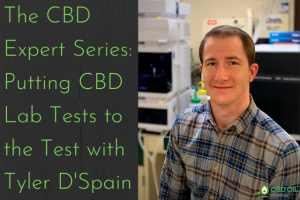
The CBD Expert Series: Putting CBD Lab Tests to the Test with Tyler D'Spain
Read More
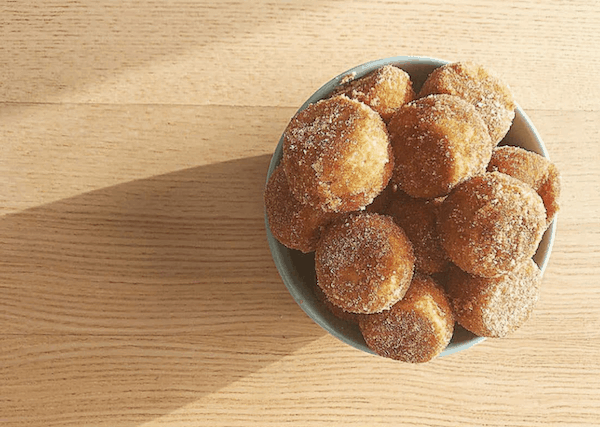
MasterChef Nick Nappi's CBD Apple Cider Donut Hole Recipe
Read More
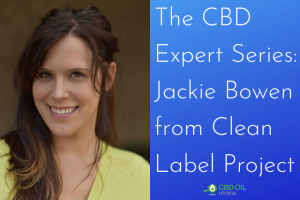
The CBD Expert Series: Jackie Bowen from Clean Label Project
Read More

The CBD Expert Series: Certificates of Analysis 101 with Dustin Jones
Read More
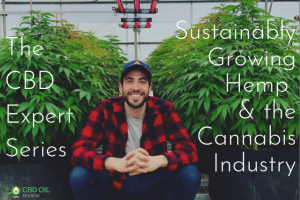
The CBD Expert Series: Sustainably Growing Hemp & the Cannabis Industry
Read More
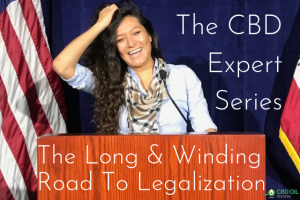
The CBD Expert Series: The Long & Winding Road To Legalization
Read More
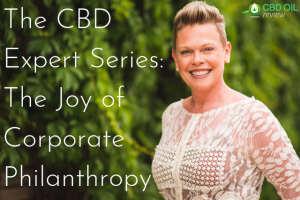
The CBD Expert Series: The Joy of Corporate Philanthropy
Read More
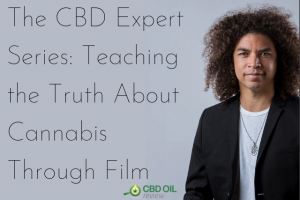
The CBD Expert Series: Teaching the Truth About Cannabis Through Film
Read More
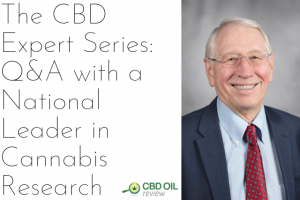
The CBD Expert Series: Q&A with a National Leader in Cannabis Research
Read More

The CBD Expert Series: Sexual Health and Pleasure with Sex Educator Kiana Reeves
Read More
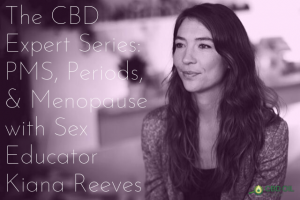
The CBD Expert Series: PMS, Periods, & Menopause with Sex Educator Kiana Reeves
Read More
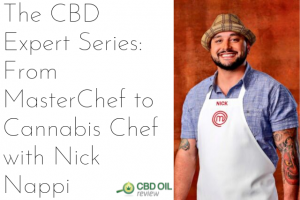
The CBD Expert Series: From Masterchef to Cannabis Chef with Nick Nappi
Read More
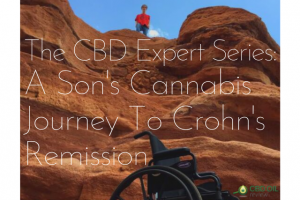
The CBD Expert Series: A Son's Cannabis Journey To Crohn's Remission
Read More
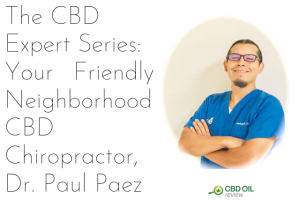
The CBD Expert Series: Your Friendly Neighborhood CBD Chiropractor, Dr. Paul Paez
Read More
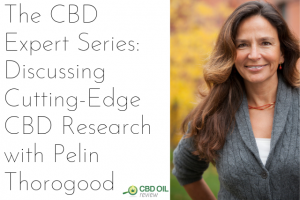
The CBD Expert Series: Discussing Cutting-Edge CBD Research with Pelin Thorogood
Read More
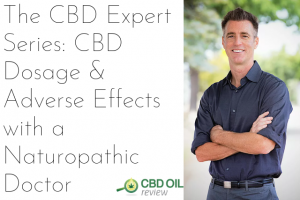
The CBD Expert Series: CBD Dosage & Adverse Effects with a Naturopathic Doctor
Read More

The CBD Expert Series: Talking Drug Tests with a Lab Tech
Read More
Opinions expressed in this article are those of our guest (the interviewee) and not necessarily of CBD Oil Review.
6 Smart Questions to Ask BEFORE You Buy CBD
Get the Ultimate CBD Buyer’s Guide and you won’t look at CBD the same way again!



 search
search